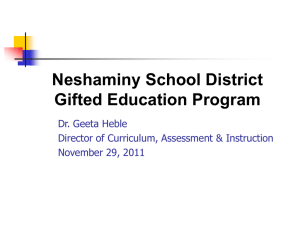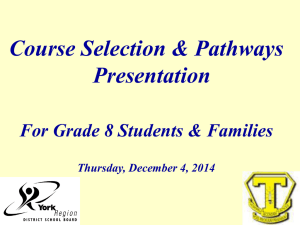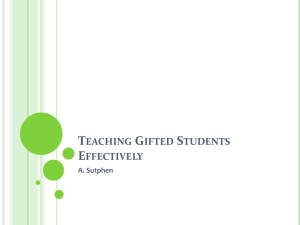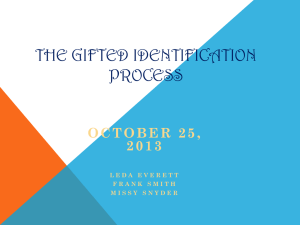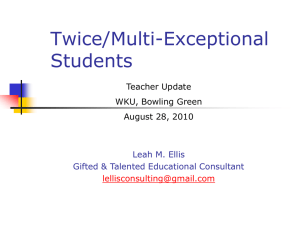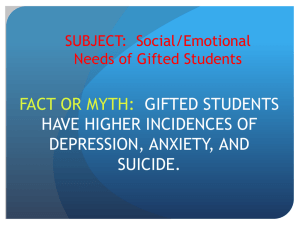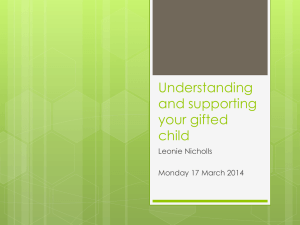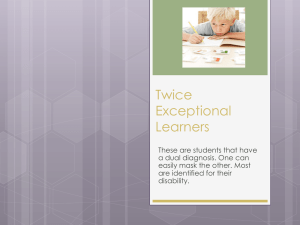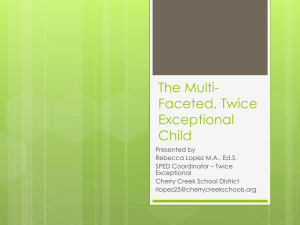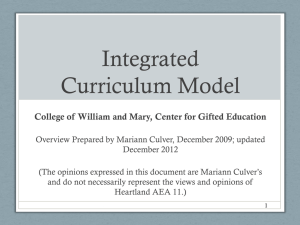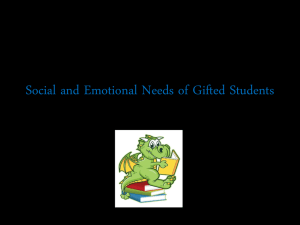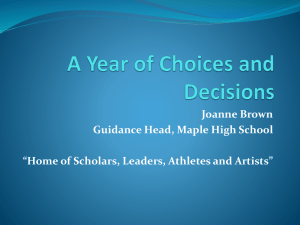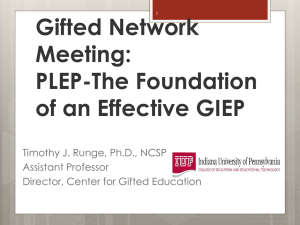File
advertisement
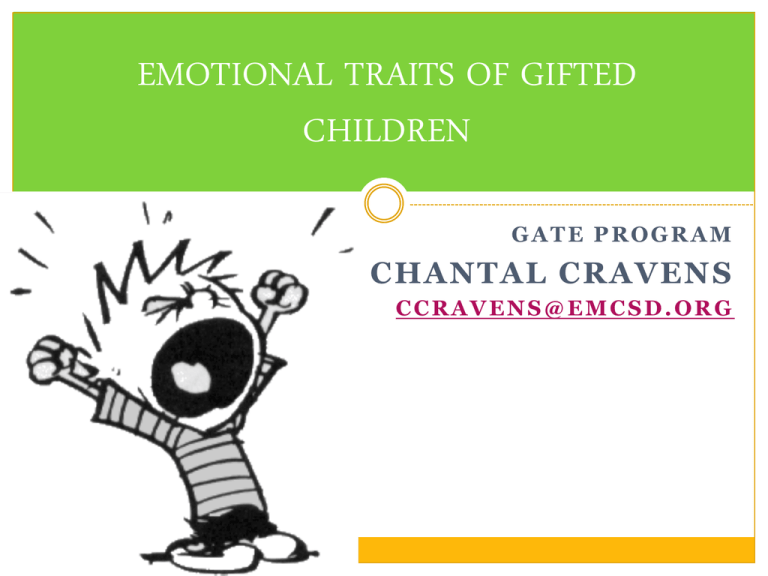
EMOTIONAL TRAITS OF GIFTED CHILDREN GATE PROGRAM CHANTAL CRAVENS CCRAVENS@EMCSD.ORG One can never consent to creep when one feels an impulse to soar! – Helen Keller Most schools focus on Intellectual and Academic Giftedness and try to estimate potential in these areas using tests. (Tests are simply shorthand attempts to measure what we could observe, if we had enough time and the proper settings. We need to focus on behaviors as much as on test scores.) (IQ) 55 Mean= 100 70 85 100 Standard Deviation= 15 115 130 145 160 level range Prevalence Mildly gifted 115 – 129 1:6 – 1:44 Flip side of this is Range of 70-85 IQ 115 130 1 standard Deviation level range Prevalence Moderately gifted 130144 1:44 – 1:1,000 Flip side of this is 69-50 IQ Two Standard Deviations level range Prevalence Highly Gifted 145159 1:1,000 – 1:10,000 Asynchronicity The more gifted you are, the more different you are from your age peers. The less you feel you “fit in”. 130 IQ- minimum IQ to qualify for GATE program- one in 44 people. Highly gifted: 144 IQ is 1 in 1,000 people Level of Giftedness Ruf (2003) Levels of Score Giftedness Range Descriptive Designation Level One 120 -129 Moderately Gifted 120124/Gifted 125-129 Level Two 130-135 Highly Gifted Level Three 136-140 Exceptionally Gifted Level Four 141+ Exceptionally to Profoundly Gifted Level Five 141+ Exceptionally to Profoundly Gifted What happens to the rat that stops running the maze? The doctors think it's dumb when it's just disappointed. – Mark Eitzel Complex sentence structure Issues for students Boredom Underachievement Peer Issues Feelings of Not Belonging Anger Power Struggles Stress and Perfectionism “8 Great Gripes of Gifted Kids” See handout Usually a Plus, but not always Misdiagnosis Health and Behavioral Problems Asthma Allergies Reactive Hypoglycemia (next slide) Existential Depression Expectations of Others Judgment Lags behind Intellectual Abilities Reactive hypoglycemia Greedy brains Mood swings Eat every 3 hours Foods with protein and carbohydrate mix Dual Diagnosis and Misdiagnosis of Gifted Children, James Webb Interesting … If you know a child’s IQ, you can predict the parent’s IQ within 10 points. Chances are there is a gifted parent in the mix. Chances are that one of you (or both) have OE’s too …explains a lot, doesn’t it? Asynchronous developmentout of sync with their traits and peers Intellectual ability-11 Actual age- 8 Physical Skills-9 Social maturity-7 John Hughes Highly gifted High School dropout “I didn’t grow up gifted, at least not by name. I grew up being asked what was wrong with me.” Joseph Hughes, age 19 Great Books Living With Intensity by Susan Read Daniels and Mike Piechowski An estimated 15-20% of men, women and children have a highly sensitive nervous system, but few people know that this level of sensitivity is an inherited, biological trait. Help is on its Way by Jenna Forrest is a must read. www.jennaforrest.com handout: http://www.sengifted.org/archives/articles/overexcitability-and-the-gifted Find others who share your interests and “get you”. www.pagegifted.com blog article “You are not alone”- 6-4-12 post How to Take Care of Yourself: Learn to fail and to laugh Get out and exercise & to relax Learn to say NO Prioritize your activities Set reasonable goals Give yourself enough time Be flexible to alternative paths Savor success Graciously accept praise Which are you? Which is your mate? Introvert Extravert People drain me People energize me Private self and public What you see is what self I like to mentally rehearse what I say I am the quiet observer you get I think out loud I’m the one with my hand up. I need to participate. http://gate.emcsd.org/wp-content/uploads/2012/04/Intoversion_Gifted-Boys_Gifted-Girls.pdf Creativity People Who Became Eminent These children learned to think and express themselves clearly. All had learned to be persistent in pursuing their own visions and goals. Many had difficult childhoods (which may have been a spark) Poverty Broken homes Physical handicaps Parental dissatisfaction Controlling or rejecting parents Counseling Gifted Children and Adults First, find someone who specializes or has an indepth knowledge of the gifted. http://www.sengifted.org/articles_counseli ng/Webb_MisdiagnosisAndDualDiagnosis OfGiftedChildren.shtml A Parent’s Guide To Gifted Children by James Webb is a real gem! Resources www.sengifted.org SENG http://opac.acer.edu.au:8080/dbtwwpd/exec/dbtwpub.dll?TN=membersaei_athen s&QY=find%20(DATE%20OF%20ENTRY%20 %3DGifted)&RF=GiftedBrief&DF=GiftedFull& CS=1&MR=50&NP=2&ID=gifted&AC=QBE_Q UERY Resources and research from Australia

